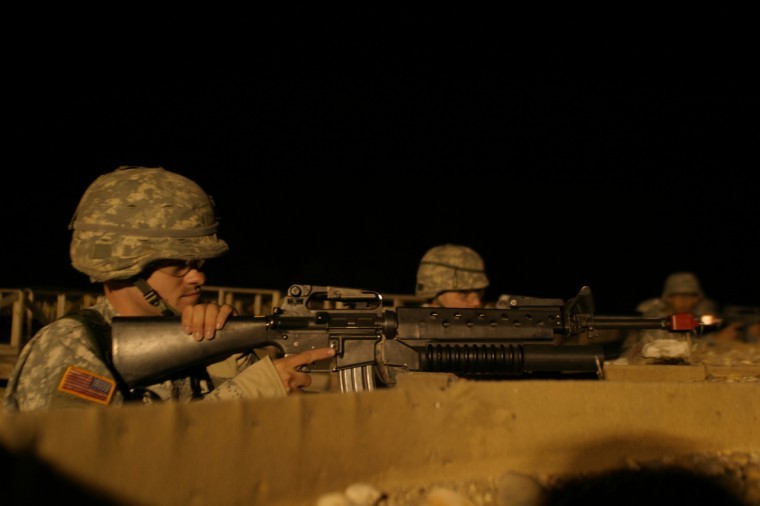ROTC cadets take part in field training exercises over weekend
MSII Cadet Andrew Hansen, sophomore business administration major, secures the base during an exercise demonstrating a late-night attack during ROTC training at the Marseilles Training Center Friday night.
April 29, 2012
As two helicopters approached the intramural fields near Stevenson towers Friday, NIU ROTC cadets filed in line and waited for their “deployment” to Marseilles Training Center, located in LaSalle County.
The helicopters took the freshmen and sophomores (MS1s and MS2s) at 12:30, and returned for the remaining cadets after.
One main goal for this field training exercise (FTX), was to give the juniors (MS3s) training for this summer’s leadership development and assessment course (LDAC), at Fort Lewis, Washington. The seniors (MS4s) helped run the FTX, along with seven instructors.
Day One
As the pair of helicopter pilots gave the cadets a fight for their stomachs, the back hatch remained open, creating an even more daring experience.
When the helicopters landed, the real-life simulation began. Cadets filed out the back, guns in hand, and immediately secured the landing area. Next, they received their first mission.
“Our whole mission was to get to the FOB [forward operating base], which was going to be our living quarters this weekend, but on the way we were attacked by Op-4,” said MS1 Cadet Sam Beamish,freshman psychology major.
As the MS1s and MS2s squads walked through a “town,” members of Op-4, a volunteer group sent to roleplay with the cadets, forced the cadets into combat. MS1 Cadet Tontania English, sophomore pre-nursing major, said scenarios like this are her favorite because she wants to be an Army nurse and she feels it’s good experience.
“I love that it was realistic because it actually gave me a perception of how it’s really going to be and what I’m getting myself into,” English said.
After securing the town, the cadets continued to the FOB, where each squad set up their barracks. During downtime, cadets rummaged through their meal packs (MREs) for “the good stuff.” Besides the MREs, Food was also ordered in from a local vender for “chow time” at 18:00, and lights-out was soon after.
Day Two
Wait a second… the day was not over for the cadets. A large explosion woke the students just before midnight, and they spent the next chilling hour or so, with temperatures reaching down in the 30s, combating the Op-4 and protecting their base.
“I’m going to be honest, I did not like that,” English said. “For one, me being cold, I can’t deal with that. It was something I had to adjust to.”
Day Two (really)
“If it’s not raining, the army’s not training,” was the most used phrase Saturday.
Wake-up was set at 04:00, but storms kept the squads in their barracks until 06:15. After cadets accepted it may rain all day, they bundled into their rain gear. The MS1s and MS2s were assigned numerous missions around the muddy grounds of Marseilles, and the MS3s were sent to the “village” to work with the “villagers.”
“That’s kind of the real world stuff that lieutenants are dealing with today,” said Lt. Col. David Dosier, Military Science Department chair. “They go to Afghanistan or Iraq and they have to work with a village elder to try to get things accomplished.”
Around noon, the MS3s got word of a possible improvised explosive device (IED), and found the location just in time to see Dosier’s car explode. Dosier and his passenger crawled out, injured, which forced the cadets to treat the injuries and respond to the IED and other possible attacks. MS3 Cadet David Cutsinger, junior general studies major, said he prefers activities like this because it creates an environment that forces the cadets to make a sound decision under pressure and stress.
“Anyone can make a good decision when it’s put on paper,” Cutsinger said. “But, when you throw in the elements, whether it be rain, cold, bullets flying, and everything just not going right, you still have to make a decision and stay with it.”
Dosier said he thought the weekend went well because they were able to do some tactical training to prepare the MS3s for this summer and created a fun and challenging weekend for the MS1s and MS2s, Dosier said.
“The environmental conditions contributed to that,” Dosier said. “It was cold, it was wet, they were sleep-deprived, and then they had to push themselves physically through the whole day.”
Cutsinger said last year’s FTX was controlled and organized, while this year’s was more chaotic and up in the air.
“This year’s was very,’You get down into the fire,’” Cutsinger said. “It was more realistic to what actually goes on over seas.”







